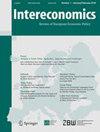Convergence in GDP per Capita in the Euro Area and the EU at the Time of COVID-19
Q1 Economics, Econometrics and Finance
引用次数: 0
Abstract
Abstract This paper investigates determinants of convergence in GDP per capita in the euro area and the EU between 1995 and 2021. It finds that the COVID-19 crisis temporarily slowed convergence but the estimated negative impact is significantly smaller than during the global financial crisis. Diverging effects emerged linked to the timing of the pandemic, the tightness of lockdown measures and the importance of contact-intensive sectors in the economy, like tourism. However, the easing of lockdown measures coupled with policy support (including the successful vaccination strategy) mitigated the risks of a pandemic-driven persistent divergence in growth. Regression results provide further evidence of convergence in the euro area and the EU over the period 1995-2021 and highlight the slowdown in convergence since the global financial crisis, which can be mostly attributed both to a contraction in investment rates in converging countries and to the limited catch-up in total factor productivity growth, especially in euro area countries.COVID-19时期欧元区和欧盟人均GDP趋同
本文研究了1995年至2021年间欧元区和欧盟人均GDP趋同的决定因素。报告发现,2019冠状病毒病危机暂时减缓了趋同,但估计的负面影响明显小于全球金融危机期间。出现了不同的影响,与大流行的时间、封锁措施的严密性以及旅游业等接触密集型经济部门的重要性有关。然而,放松封锁措施,加上政策支持(包括成功的疫苗接种战略),减轻了大流行导致增长持续分化的风险。回归结果提供了1995-2021年期间欧元区和欧盟趋同的进一步证据,并强调了自全球金融危机以来趋同的放缓,这主要归因于趋同国家投资率的收缩和全要素生产率增长的有限追赶,特别是在欧元区国家。
本文章由计算机程序翻译,如有差异,请以英文原文为准。
求助全文
约1分钟内获得全文
求助全文
来源期刊

Intereconomics
Economics, Econometrics and Finance-Economics, Econometrics and Finance (miscellaneous)
CiteScore
5.00
自引率
0.00%
发文量
66
审稿时长
16 weeks
期刊介绍:
Intereconomics publishes papers dealing with economic and social policy issues in Europe respectively in Euroland. The journal consists of the sections editorial, forum and articles. The editorial section contains brief comments on current questions of economic policy in Europe or effecting Europe. In the forum, several authors (researchers, politicians, representatives of trade unions and of employers associations etc.) voice their opinions on one particular current economic policy problem effecting Europe. The articles deal with economic policy issues and trends in Europe. They are mostly written by researchers in economics. Officially cited as: Intereconomics
 求助内容:
求助内容: 应助结果提醒方式:
应助结果提醒方式:


